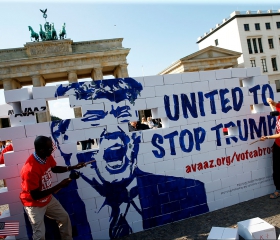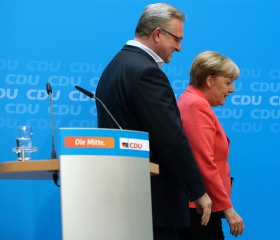Germany's European Leadership: Hegemony against One's Will?
In
Login if you are already registered
(no votes) |
(0 votes) |
PhD in Philology, Leading Researcher at the German Studies Center of the RAS Institute for European Studies
In recent years, Europe and beyond have been increasingly more vocal about Germany regaining its leadership in the Old World. The discussion appeared especially heated in connection with the debt crisis of Greece, as it was Berlin which happened to come out as the key driver and architect of the scheme for its restructuring, and in return faced charges of a new hegemonic wave. In addition, it was Berlin which launched the open door policy for refugees only to cause a most painful response from many European countries.
Last July the European Council on Foreign Relations (ECFR) published a truly landmark article [1] on a burning political issue - Germany's leadership in Europe. Insisting that Germany has become the continental hegemon, the authors Josef Janning and Almut Möller describe the situation as follows.
First, Germany's leadership is essential for resolving military conflicts along the EU’s borders (Ukraine and before that the Balkans) as well regulating migration flows. To this end, Berlin is prepared to become more active in regional diplomacy notwithstanding the relatively high risks such as the controversial Turkey deal.
Second, Germany's economic and political muscle make it the de facto European hegemon, but Berlin fears a negative response from neighbor states that remember German aggression, as well as attempts to impose its predominance through military action. Instead, the German government is flexibly building a political core within the EU by building coalitions and maintaining multilateral relations. So, the long-term turn of German attention towards the EU in the light of the current problems is seen by other European countries as a way to channel Germany's energy towards the creation of the a European home.
Third, Berlin itself prefers to remain a regional actor within the EU although the United States has effectively "saddled Germany with the role of hegemon in Europe."
To what extent are these conclusions correct? Is Germany really becoming a willy-nilly Europe-wide skipper and is this really good for its transatlantic partners, to say nothing of its neighbors?
In recent years, Europe and beyond have been increasingly more vocal – sometimes critically and reproachfully, sometimes with undisguised joy – about Germany regaining its leadership in the Old World. The discussion appeared especially heated in connection with the debt crisis of Greece, as it was Berlin which happened to come out as the key driver and architect of the scheme for its restructuring, and in return faced charges of a new hegemonic wave. In addition, it was Berlin which launched the open door policy for refugees only to cause a most painful response from many European countries.
Germany: from Ruins to Leadership

New power means new responsibility
What has been Germany's path to leadership and is it something palpable?
After 1945, the Germans found themselves in a new era split along the Cold War frontline. The niche and the role of West and East Germany were defined by the strategic plans of the NATO and Warsaw Pact general staffs. Both countries were exploited in the propaganda war as showcases of the capitalist and socialist worlds. In both of them, all major economic decisions were invariably taken with an eye to the USA and the USSR, the big brothers, as well as to each other.
At the same time, back in early 1950s, the first NATO Secretary General Hastings Ismay launched a strategic initiative aimed "to keep Americans in, to keep Russians out, to keep Germans down." The move effectively restricted the sovereignty of West Germany that offered its territory to the troops of the United States, Great Britain, France, Belgium and other states. Later it had to deploy nuclear weapons which are still on alert. East Germany went through a similar treatment up to the collapse of the Warsaw Pact Organization and its absorption by West Germany.
Instead, the German government is flexibly building a political core within the EU by building coalitions and maintaining multilateral relations.
The political emancipation of Germany began to slowly advance after reunification, preceded by lengthy 2+4 negotiations with the participation of the two Germanys and four WW2 victors. Of course, the merger became a powerful incentive for the Germans, politicians and diplomats included, in the search for a new niche in the international arena. The process was shaped by several fundamental factors. First, the Main Law of the Federal Republic of Germany stipulates that its territory shall never emanate a military threat (even the appropriate Article 115 is titled The Case of Defense), which specifies the limited character of the German army's participation in the overseas operations of NATO. Second, UN Charter Articles 53, 77 and 107 on the aggressor states explicitly pointed to the FRG as the successor of the Third Reich and were abolished as obsolete only in 1995.
Nowadays, Germany is striving for a permanent seat on the UN Security Council, and already had nonpermanent status in 1995–1996, 2003–2004 and 2011–2012. To acquire permanent status, Berlin is quite active in the UN reform process and generous in financing its operations. As of 2013, its contribution of about USD 180 million made up 7.1 percent of the UN’s total budget. Although the reform activities were virtually frozen in 2005, Berlin regards the key global organization as a major platform for strengthening its role, gaining weight on the global arena and elevating the nation's prestige.
Freedom of Action by Grace of Washington?
Can one really agree with the ECFR authors that the US has allowed Germany to be more independent and even placed the leadership burden on its shoulders?
Germany is unquestionably a major American ally in Europe, with German leaders invariably stressing the importance of transatlantic relations for their country. The German political elite by no means questions its indebtedness to the Western allies for its liberation from Nazism. But is it the United States that has set off the drive for Germany's greater international role to make it a kind of underboss in charge of Europe?
To a certain extent, the statement is true if we turn to the political developments in Europe of the 1990s. Extremely important for Germany's international maturation seem to have been the 1990-1999 events in former Yugoslavia, the first major challenge for Berlin's foreign policy. NATO's military operation against the Bosnian Serbs in 1995 and the aggression against Yugoslavia in March-April 1999 were the maiden inroads of the Bundeswehr beyond Germany, which predictably brought about numerous unsavory associations with Adolf Hitler's actions. The action must have been certainly sanctioned by Washington, but at the same time the German drive into the Balkans also met Berlin's interests. It was Germany's Balkan policy that showed that the unified state had become the key actor in Central Europe and had even managed to shed some of its guilt complex generated by WW2 [2]. At that, many Russian researchers underline that Germany's policy in the Balkans has directly or indirectly boosted the conflict potential in the region.
It was Germany's Balkan policy that showed that the unified state had become the key actor in Central Europe and had even managed to shed some of its guilt complex generated by WW2.
Promoting its national interests in Southeast Europe (though within the EU and in a rigid diplomatic link with the United States), Germany is attempting to raise its international status to the regional-power level using economic tools (financial aid and commercial expansion) and soft power.
Apart from the Balkan front which has obviously propelled Germany's political rise, Berlin has had other diplomatic successes, i.e. the Weimar Triangle (the joint German-French project launched in 1991 to politically and economically integrate Poland intounited Europe) and numerous Eastern Partnership programs oriented towards the former USSR, first of all Belarus, Ukraine, Moldova and the Transcaucasia countries. German political foundations and organization have their branches all over the post-Soviet space, with businesses following suit. Before the Russia-EU freeze in 2014, Russia had been swept by more than six thousand German firms, only proving that German diplomacy and businesses go hand in hand helping each other.
Germany's European policy rejects any sort of hint of military confrontation, while the focus is on dynamic engagement of business for advancing German leadership in Europe, first of all in East Europe. As a matter of fact, the German economy is explicitly export-oriented through selling high-tech equipment, engineering products and other high-VAT items as widely as possible, East Europe and Asia included. Today, German diplomacy has to struggle between the sanctions and interests of the national business. Note that Berlin followed Washington and London in imposing the anti-Russian sanctions, and now the Germans are again in the wake of American policies strongly insisting on their extension.
In 2012, the German Foreign Ministry launched a new foreign policy strategy titled "Shaping Globalization – Expanding Partnerships – Sharing Responsibility," virtually consolidating the existing platforms and formats of Germany's cooperation with key partners in the East, i.e. Russia, Turkey, etc. The paper underlines that Germany is linked to these countries by long-term economic partnerships, which means that Berlin is quite an independent diplomatic actor. More emancipation in Germany's policies may be found in its refusal to agree to the US terms in the TTIP agreement because the Germans see it as outwardly biased in Washington's favor. Of course, this hardly means a full rejection of the project but rather procrastination of the process to win an American compromise.
Focal Points of German Foreign Policy
Along with relationships with the United States and EU countries, today Germany is putting in major foreign policy efforts toward Greece, Ukraine and Turkey. But are the ECFR authors really correct by insisting that Germany is an indispensible negotiator and an honest broker in conflict regions?
Germany posed as an extremely tough negotiator as far as Greece was concerned, stating its leadership in the financial policy of united Europe. Berlin was most active in establishing the European Financial Stability Facility and the European Stability Mechanism and brought German banks to finance the projects. These institutions are intended to render financial support to European countries in need, provided they stick to the austerity rules.
Germany's European policy rejects any sort of hint of military confrontation, while the focus is on dynamic engagement of business for advancing German leadership in Europe.
Another example of German toughness on debts can be found in the Cyprus crisis of 2012. When Nicosia applied to Russia for credits to alleviate the plight, Germany blocked the step suggesting that it could create a dangerous precedent for a Eurozone member to become financially dependent on a third party.
Germany also exploits the Eurozone dire straits by using negative interest rates on loans and securities. According to former chief economist of European Central Bank Jurgen Stark, if the Bundesbank issues securities at -0.009 percent per annum, investors are doomed to plunge into losses, while Germany virtually gains by borrowing.
Germany is also widely criticized for its immense trade surplus, as in June 2016 it exported goods and services worth 106.8 billion euro, its imports were 82 billion euro, and the difference exceeded 20 percent. Some economists, among them Professor Heiner Flassbeck, believe that German exports have been artificially inflated because of the excessively cheap euro in the initial years of its existence (about 0.9 percent of USD). Besides, Germany made a stake on salary dumping inside the Eurozone to create a competitive abyss vis-à-vis other EU countries. Brussels set the desirable inflation threshold of two percent a year, which among other things meant a two-percent rise in the labor cost. But in the recent years Germany kept the labor cost at about zero, devaluating the two-percent salary and winning more exports through labor dumping.
As a result, having a huge competitive edge in exports, Germany has occupied an important and at the same time unpopular position of the sponsor for EU insolvent states. In other words, Berlin leads Europe thanks to its economic predominance, while due to the Eurozone misbalances, the EU problem countries perceive the leadership as a kind of a yoke or as the economic Fourth Reich.
As for Ukraine, from the onset of Ukrainian events in late 2013, Berlin is vigorously siding with the current Kiev rulers in full agreement with Washington. This stance, combined with attacks on Russia for its annexation of Crimea and support for rebellious Donbas, has aggravated the Russian-German relationship. At the same time, it has given rise to differences among the EU states and within the German elites. The German language has even acquired the word Putinversteher (Putin's sympathizer) – a politician or a journalist who feels good about Russian or bad about Berlin's policies.
Germany is also willing to lead the fading Normandy process, to a great extent due to the longstanding political investments into the Eastern Partnership programs.
Of special significance seems to be the Turkish vector of German foreign policy. Berlin has been playing first fiddle in the decades-long talks on Turkey's entry into the European Union. To this end, Ankara has been especially sensitive about any demarches of Brussels and Berlin in the context of the bilateral relationship.
The issues of Turkey and the German stance peaked during the 2014-2016 migration crisis, when Chancellor Angela Merkel imprudently announced Germany's readiness to receive all migrants, who perceived the statement as an all-clear signal. Soon applicants for German shelter were numerous enough to cause protest from the local population which was hardly happy about the open-door policies. Among other things, this discontent made possible the success of the rightwing Alternative for Germany party at the regional parliament elections.
Berlin leads Europe thanks to its economic predominance, while due to the Eurozone misbalances, the EU problem countries perceive the leadership as a kind of a yoke or as the economic Fourth Reich.
As a result, in March 2016, the German government decided to strike a deal with the Turks and initially provide them with three billion euro and resume negotiations on the EU entry that is the strategic goal of President Recep Erdogan. However, since Mr. Erdogan has put some of the blame for the failed coup on the EU and Brussels has refused to cancel the visa regime because of Ankara's initiative to impose the death penalty, the deal seems a pie in the sky.
It appears hardly an exaggeration that the unsettled refugee problem and the Turkish issue are hanging above Ms. Merkel like the sword of Damocles, with the Bundestag elections in the offing. If the deal is dead and Turkey responds by opening refugee corridors, she is sure to become a laughingstock both before the electorate and all of Europe engulfed in discussing the dominating Iron Lady-Chancellor. The results of recent elections in Mecklenburg-Western Pomerania hint at the decline of her epoch because mistrust is becoming increasingly obvious. The elites are abuzz about possible successors provided the traditional balance at the Bundestag elections of 2017 remains intact.
Being the Leader
In a nutshell, Germany is working hard to use its economic might and soft power to gain political weight in Europe and adjacent regions, as well as to shed the wartime-generated guilt complex that is still bothers society and the elites. At the same time Berlin sees its political mission in the transatlantic format and is trying to find self-realization primarily in the field of economy.
As far as future Russian-German relations are concerned, Berlin remains quite an intricate but indispensible partner for Moscow. Some European states fear a Fourth Reich but the prospect seems barely feasible. Berlin appears quite happy in the role of the EU economic leader and is unlikely to strive for political hegemony. At the same time, can emancipation and participation in global talks are definitely important for Berlin, as one may see from its zeal for integration-level negotiations on the TTIP and other matters.
Consequently, the conclusions of the ECFR article seem generally convincing, although one should mention that Germany's leadership has been increasingly criticized by the EU peripheral states, while the migration crisis threatens to exacerbate intra-EU differences. However, Germany's role in the united European home seems absolutely vital, as one can see from the polar opinions, which span from admiration to fears of a Fourth Reich.
1. Janning J., Möller A. Leading from the Center: Germany’s New Role in Europe. European Council on Foreign Relations, July 2016.
2. Speck U. Macht gestalten. Optionen deutscher Außenpolitik // Internationale Politik. 2012. № 1 (Januar/Februar). S. 88–96.
(no votes) |
(0 votes) |







